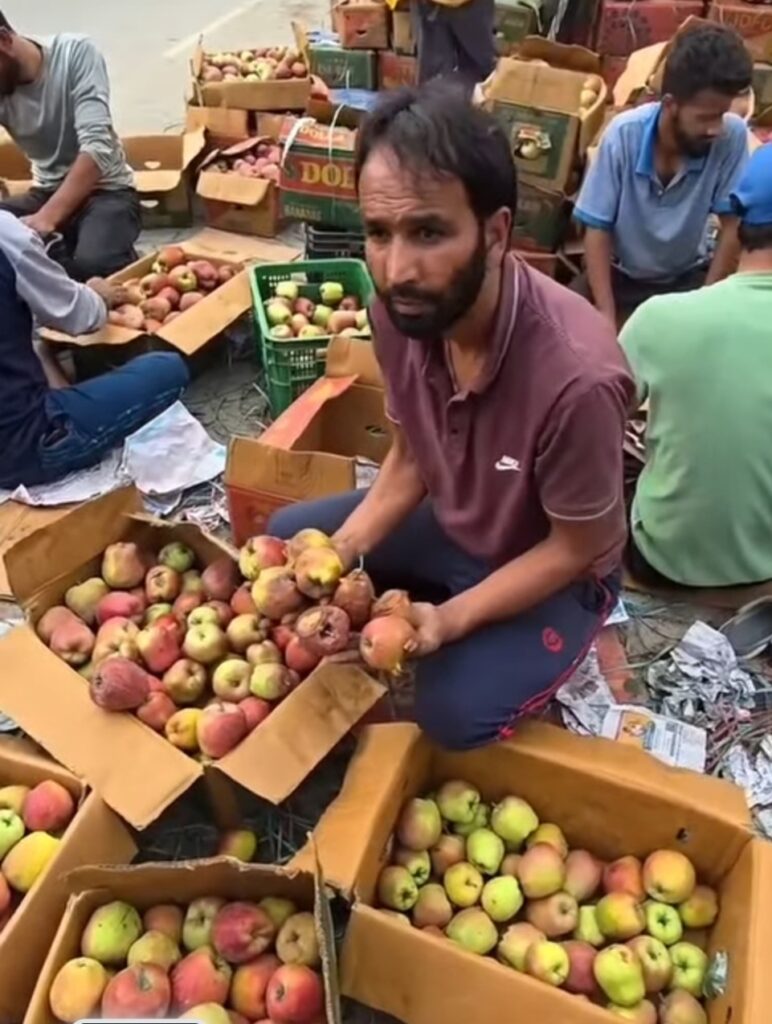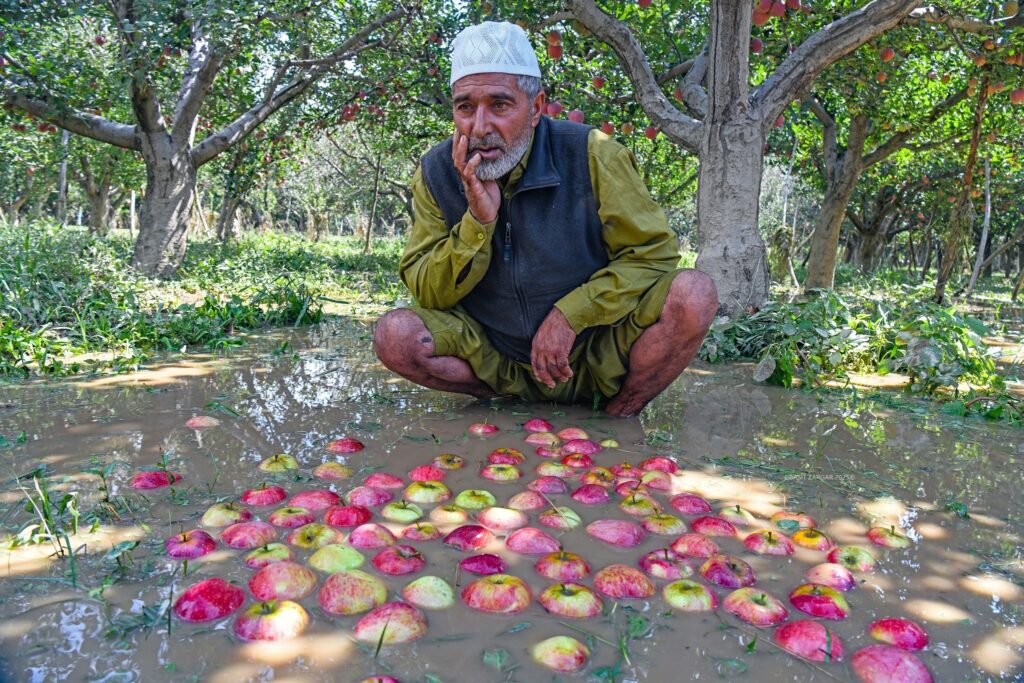Government promises quick fixes, but growers say time is running out for this billion-dollar industry.
By Ajaz Rashid
In the crisp September air of Shopian’s fruit mandi, the smell of ripe apples usually signals prosperity. Wooden crates piled high, trucks revving, traders bargaining — these are the rituals of autumn in Kashmir, where apples are more than a crop; they are a lifeline.
But this year, the scene has turned surreal. Instead of trucks, dumpers meant for sand and gravel are being loaded with boxes of delicate fruit. Growers watch in silence, their pride bruised, their livelihoods at risk. “Right now, we are left with no choice,” said Abdul Rashid, an apple grower from Kulgam. “Trucks meant for construction material are being used to transport our fruit to Jammu. It’s risky and unfit for apples, but leaving the harvest to decay in orchards or markets is a bigger loss.”
The unusual sight captures the depth of the crisis that has gripped Kashmir’s apple industry in September 2025. With the Jammu–Srinagar National Highway (NH-44) repeatedly blocked by landslides and heavy trucks restricted on the Mughal Road, Kashmir’s billion-dollar apple trade — the backbone of the Valley’s rural economy — is staring at its darkest season in decades.
For growers, the nightmare became painfully real when several trucks loaded with apples returned from Qazigund and Ramban after being stranded for more than eight days. By the time they rolled back, entire consignments had rotted.
When I finally unlatched my truck after eight days, the sight broke me,” said Mohammad Yousuf, an orchardist from Sopore. “Every box of apples had spoiled. I had taken loans for fertilisers and packaging, believing the market would repay it. Now everything is lost.”
Abdul Hamid, a grower from Anantnag, recalled his struggle. “We spent days and nights stranded in Qazigund, waiting for the highway to clear, but our turn never came. After more than a week, we had to drive back. The apples had rotted into mush. Who will bear our losses?”
For small orchardists, the losses are catastrophic. Many had borrowed heavily this year, expecting to repay loans with apple sales. Instead, they face mounting debts and a collapsed market.

Freight Costs Triple, Prices Crash
Even when apples move, the economics are punishing. Freight costs have tripled — from around ₹100 per box to over ₹350. Transporters cite fuel costs and the long detours via the Mughal Road. “On one side, our apples are not reaching markets, and on the other, transport costs have tripled,” said Gulam Qadir.
At the same time, apple prices have collapsed. “Delicious apples, which fetched ₹1,000–1,300 per box earlier, are now selling for just ₹500–800. American apples meant for export are lying idle, rotting,” said seasoned grower Mohd Aslam.
Low-shelf-life varieties like Galla and Kiser have been worst hit. “The silicon-coated cardboard boxes trap heat when stacked for days, accelerating ripening and spoilage. That is why so much of our produce is getting ruined before it even leaves the valley,” explained Reyaz Ahmed, a grower from Rafiabad.
Loss estimates vary, but the Kashmir Valley Fruit Growers-cum-Dealers Union puts current losses at ₹1,200 crore. At Sopore mandi, growers fear the figure could climb to ₹5,000 crore if the crisis persists.
Government Scramble
This year, the scale of the crisis has prompted action in New Delhi. Union Minister for Road Transport and Highways Nitin Gadkari chaired a high-level meeting with Chief Minister Omar Abdullah, senior bureaucrats, and NHAI officials.
“We are determined to restore this vital national highway to full strength at the earliest, ensuring safety and convenience for all road users,” Gadkari said, noting that excavators and earthmovers were working round-the-clock to clear landslides.
Omar Abdullah pressed for uninterrupted truck movement. “Blacktopping can wait for its turn. But large vehicles, especially 4-axle and 5-axle trucks, cannot be diverted through the Mughal Road. This is the only viable route for them. With a huge number of trucks stranded, clearing this backlog is crucial,” he said.
Inspector General of Police (Traffic) M. Suleman Choudhary said 2,800 trucks were cleared via the Mughal Road in just two days. The government has also promised a traffic management plan allowing one-way heavy truck movement while permitting light vehicles from the opposite side.
An Economy at Risk
Kashmir’s horticulture sector is not just about fruit — it is about survival. More than 3.5 million people depend directly or indirectly on apples. The crop contributes 8% of J&K’s Gross State Domestic Product (GSDP), generating over ₹10,000 crore annually.
But today, the sector is under siege. From climate change to packaging flaws, from policy gaps to road failures, growers feel squeezed at every level. “What is more painful is that this destruction was preventable. Why did the government fail to ensure the timely clearance of the highway for fruit trucks? Why are growers always left to suffer silently?” asked Abdul Rashid, a farmer from Kulgam.

What Growers Want
As despair spreads, growers and traders are demanding a multi-pronged response:
- Uninterrupted highway access for perishable goods.
- Immediate deployment of RTC trucks to cap freight rates.
- Adequate compensation for growers whose produce has rotted.
- Alternative routes and tunnels to bypass landslide-prone stretches.
- Long-term policies to modernise storage, packaging, and transport.
“The loss is going to touch around ₹5,000 crore if immediate measures are not taken. It could be the biggest loss the industry has ever faced,” warned growers at Sopore mandi.
A Season of Desperation
Back in Shopian, Abdul Rashid, a trader, summed up the growers’ agony. “RTC vehicles can provide major relief to us. Their deployment will not only ease the pressure but also help put a cap on skyrocketing freight charges,” he said.
But for now, the stark image remains: apples, Kashmir’s pride, being hauled in dumpers, their delicate skins bruised, their market value slashed. What should have been a season of prosperity has turned into a season of despair.
Unless urgent action is taken, growers warn, the crisis of 2025 may not just be another bad year — it could be the breaking point for Kashmir’s apple economy.
Leave a Reply